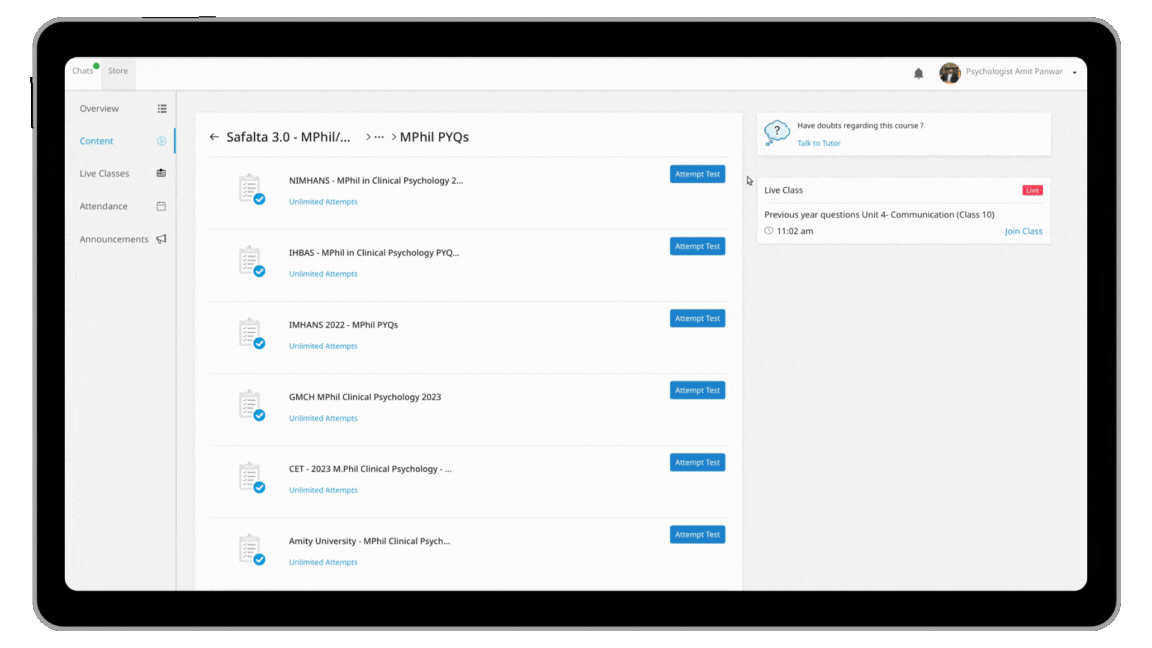Psychology has long fascinated young minds, drawing many to its vast and diverse realm. As society increasingly acknowledges the importance of mental health, the demand for psychology professionals, especially clinical psychologists, is on the rise. This field not only addresses psychological disorders like depression, schizophrenia, PTSD, and anxiety but also promotes overall psychological well-being. In India, the need for skilled clinical psychologists is greater than ever, making it a promising and fulfilling career choice.
Understanding Clinical Psychology
Clinical psychology is a specialized branch of psychology focused on the assessment, diagnosis, and treatment of psychological disorders. It involves applying psychological theories and techniques in practical settings to help individuals overcome mental health challenges and improve their quality of life. Clinical psychologists work in various environments, including hospitals, private practices, clinics, rehabilitation centers, schools, and colleges.
The Role of the Rehabilitation Council of India (RCI)
To practice as a clinical psychologist in India, one must obtain licensure from the Rehabilitation Council of India (RCI). Established under the RCI Act, 1993, this statutory body regulates training programs and sets standards for professionals in the field of rehabilitation, including clinical psychology. RCI ensures that all practicing professionals are adequately trained and qualified, maintaining a central register of accredited individuals.
Pathways to Becoming a Clinical Psychologist in India
There are three primary pathways to becoming a licensed clinical psychologist in India, each offering unique training and career opportunities:
1. MA Clinical Psychology (formerly known as MPhil Clinical Psychology)
2. Doctorate of Psychology (PsyD)
3. Post graduate Diploma in Clinical Psychology (PGDCP)
RCI has now launched a new program at Bachelors level, B.Sc. Clinical Psychology for Science Stream students. To know more, click here.
MA Clinical Psychology
The MA Clinical Psychology is a two-year postgraduate program designed to provide in-depth theoretical knowledge and practical clinical experience. It prepares students for a career in clinical practice by focusing on both academic learning and hands-on training in real-world settings.
Kindly Note: MPhil has now been renamed to MA Clinical Psychology program keeping in lines with the NEP, 2020.
Eligibility and Admission: To enroll in the MA Clinical Psychology program, candidates must meet the following eligibility criteria:
Bachelor’s Degree in Psychology:
- Candidates who have completed a 4-year Bachelor’s degree in Psychology as per the NEP 2020 framework are eligible to apply.
- Those with a 3-year Bachelor’s degree in Psychology must also have a Master’s degree in Psychologywith at least 55% marks from a UGC-recognized university.
Entrance Examination and Interview:
Admission typically involves an entrance examination, assessing foundational knowledge in psychology, followed by a personal interview to evaluate suitability for the program.
(For final update on this, kindly visit the RCI website.)
Career Opportunities: Graduates of the MA Clinical Psychology program (previously MPhil Clinical Psychology) are eligible for roles in:
- Hospitals and mental health clinics.
- Rehabilitation centers and community health organizations.
- Academic institutions as educators or researchers.
- Private practice as licensed clinical psychologists.
This qualification provides students with the essential skills to begin their careers as clinical psychologists immediately upon graduation, making them competent professionals in mental health care.
CRR Registration with RCI: Upon completing the program from an RCI-approved institution, graduates are eligible for Central Rehabilitation Register (CRR) registration, commonly referred to as the RCI License. This registration is a mandatory requirement for practicing as a clinical psychologist in India.
Doctorate of Psychology (PsyD)
The PsyD is a four-year doctoral program focused on clinical practice rather than research. It aims to develop highly skilled clinicians proficient in diagnosing and treating a wide range of psychological disorders. The program emphasizes practical training over theoretical research, making it ideal for those who wish to work directly with clients.
Program Structure:
• First Two Years: Training in foundational skills and professional development.
• Third Year: Advanced proficiency in chosen sub-specializations.
• Fourth Year: Completion of a clinical internship and submission of a research thesis.
Eligibility and Admission: Candidates with a Master’s degree in Psychology can apply for the full four-year program, while those with an MPhil in Clinical Psychology may enter through lateral entry directly into the third year. Admission is based on an entrance exam specific to the entry point.
Post Graduate Diploma in Clinical Psychology (PGDCP)
For those unable to commit to the longer MPhil or PsyD programs, the PDCP offers a one-year RCI-approved diploma in clinical psychology. This program provides the necessary training to practice as a clinical psychology associate, allowing graduates to work in hospitals and provide mental health services under supervision.
Eligibility and Admission: Applicants need a Master’s degree in Psychology or Applied Psychology with at least 55% marks. Admission involves a written test and an interview round.
Comparing MA, PsyD, and PDCP
Each of these programs serves different professional goals and timelines:
Conclusion
Choosing a career in clinical psychology requires dedication, rigorous training, and a passion for helping others. Whether you opt for the MA, PsyD, or PDCP pathway, each route offers valuable opportunities to contribute to mental health and well-being. As you embark on this journey, consider which program aligns best with your career aspirations and personal commitments.
Quote to Ponder:
“It takes determination to see a dream come to pass. The question is not will you start, but will you finish.”
Prepare diligently, stay committed, and let your passion for psychology guide you toward a rewarding career in clinical practice.
I hope this exploration of clinical psychology options in India provides a clear and comprehensive understanding for aspiring professionals. If you have any questions or need further guidance, feel free to reach out.

Practice Rare Previous Year Papers
Power Within's SAFALTA course offers aspirants with the rare Previous year papers of MPhil in Clinical Psychology which provides details insights into the pattern and the kind of questions asked in the major exams for MPhil, such as, IHBAS, NIMHANS, CIP, RML, and many more.




